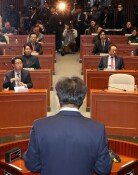Unstable economy due to strong dollar and low yen
Unstable economy due to strong dollar and low yen
Posted June. 29, 2024 07:30,
Updated June. 29, 2024 07:30
The steep decline in the yen's value has caused the yen-dollar exchange rate to exceed 160 yen for three consecutive days, reaching its highest since December 1986. Simultaneously, the won-dollar exchange rate has been volatile, dropping to the 1,370 won level, creating instability in the Korean economy and financial market amidst the combined effects of the ‘king dollar’ and the ‘super low yen.’
Despite Japanese authorities' intervention in the foreign exchange market, including releasing 9.7 trillion yen worth of dollars, the yen-dollar exchange rate surpassed the psychological threshold of 160 yen. With the United States continuing its high growth rate and the likelihood of an interest rate cut diminishing, some market predictions suggest the yen could weaken further to 170 yen per dollar.
A prolonged yen weakening poses challenges for the Korean economy as it enhances the price competitiveness of Japanese exports, potentially hurting Korean exports, particularly in sectors like automobiles and steel. Additionally, increased Japanese tourism might widen Korea's travel balance deficit.
The stronger synchronization between the yen and the won means a weaker yen could elevate the won-dollar exchange rate. While a higher exchange rate is typically beneficial for exporters, the concurrent depreciation of competing countries' currencies negates this advantage. Instead, higher import prices could elevate domestic consumer prices and increase companies' cost burdens. Despite recent signs of export recovery, there are concerns that a high exchange rate may hinder the Korean economy by stalling domestic demand recovery.
The primary concern is the rising volatility in financial markets. Japanese authorities selling overseas assets to bolster the yen's value could increase instability, including a rise in U.S. Treasury bond yields. With additional factors such as political uncertainty and geopolitical risks in the U.S. and Europe, it is inappropriate for the government and some ruling party members to pressure the Bank of Korea to lower interest rates, which could exacerbate exchange rate instability. Prioritizing policies to minimize the side effects of an ultra-low yen and stabilize the exchange rate is essential.







